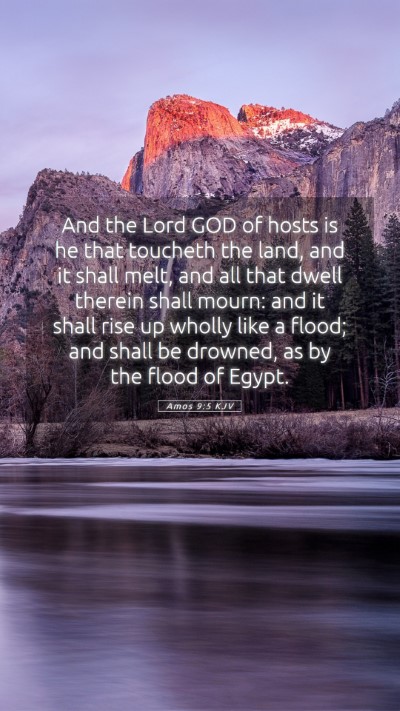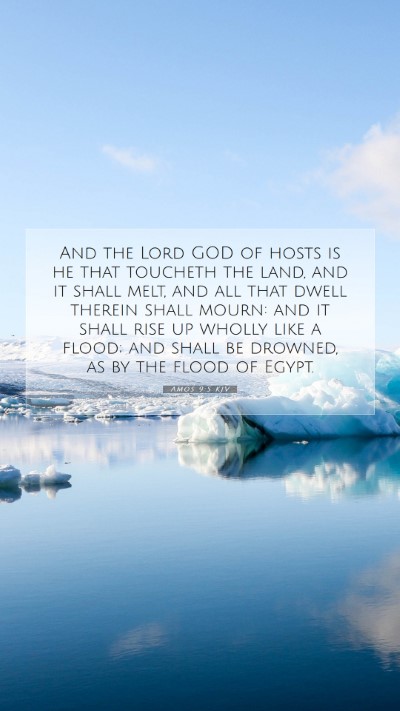Old Testament
Genesis Exodus Leviticus Numbers Deuteronomy Joshua Judges Ruth 1 Samuel 2 Samuel 1 Kings 2 Kings 1 Chronicles 2 Chronicles Ezra Nehemiah Esther Job Psalms Proverbs Ecclesiastes Song of Solomon Isaiah Jeremiah Lamentations Ezekiel Daniel Hosea Joel Amos Obadiah Jonah Micah Nahum Habakkuk Zephaniah Haggai Zechariah MalachiAmos 9:5 Meaning
What is the meaning of Amos 9:5?
And the Lord GOD of hosts is he that toucheth the land, and it shall melt, and all that dwell therein shall mourn: and it shall rise up wholly like a flood; and shall be drowned, as by the flood of Egypt.
Amos 9:5 Bible Verse Meaning
Understanding Amos 9:5
Amos 9:5 states, "And the Lord GOD of hosts, he that toucheth the land, and it shall melt, and all that dwell therein shall mourn: and it shall rise up wholly like a flood; and shall be drowned, as by the flood of Egypt." This verse is a profound warning about the sovereignty of God and His capacity to judge the nations and the earth. Here, we explore the meaning and interpretations of this verse, drawing on insights from various public domain commentaries.
Bible Verse Commentary
This passage can be understood and analyzed through several key themes:
- The Sovereignty of God: The mention of the "LORD GOD of hosts" emphasizes God's supreme authority over all creation. Matthew Henry notes that the term "hosts" refers to the vast armies of heaven, suggesting that God's power is not limited to the earthly realm but extends to all spiritual and cosmic entities.
- The Judgment of the Land: The phrase "he that toucheth the land, and it shall melt" signifies divine judgment. Albert Barnes explains that God's touch can bring both creation and destruction. The idea of the land melting can be interpreted as a metaphor for God's fiery judgment that leads to the end of sin and corruption.
- Mourning of the People: "All that dwell therein shall mourn" reflects the collective grief that follows judgment. Adam Clarke interprets this mourning as the recognition of consequences due to sin and turning away from God’s commandments, drawing attention to how judgment affects not just a few but the entire community.
- The Rising Flood: The imagery of the land rising up "wholly like a flood" and drowning evokes the catastrophic nature of God’s judgment. This can remind us of the flood in the days of Noah, representing a fresh start for humanity after divine cleansing.
- Historical Context: Understanding the historical context is crucial. Amos was prophesying to the Northern Kingdom of Israel during a time of economic prosperity but moral decay. The judgment foretold serves as a warning to the Israelites regarding their idolatry and injustice.
In-depth Bible Verse Analysis
The depth of this verse invites a closer look at how it can apply to our lives today:
- Personal Reflection: This passage encourages believers to reflect on their lives and the impact of their choices. Are we living in accordance with God's will, or are we opening ourselves to judgment through our actions?
- Community Awareness: The mourning described can prompt communities to evaluate their collective behavior and the societal issues they face. The call for repentance becomes crucial in light of such divine warnings.
Bible Study Insights
When dissecting this verse, it's beneficial for Bible study groups to engage in discussions that foster deeper understanding:
- Shared Learning: Utilize tools and resources available in online Bible study platforms to examine this verse alongside commentaries and cross-references.
- Group Discussions: Consider exploring the implications of God's sovereignty in today’s context during Bible study lessons, helping each member to apply insights gained to personal and communal life.
Related Bible Cross References
This verse connects with several other scriptures that deepen its meaning:
- Isaiah 24:19-20: Discusses the earth being shaken and reeling due to God's judgment, paralleling Amos’s imagery.
- Joel 2:11: Describes God’s army and the great day of the Lord, echoing themes of divine sovereignty and dreadful judgment.
- Micah 1:4: “And the mountains shall be melted under him, and the valleys shall be cleft," showing how God’s presence causes the earth itself to react.
Conclusion
Amos 9:5 offers a poignant reminder of God's authority and the consequences of turning away from Him. Engaging with this verse through study and reflection can lead to a more profound understanding of Scripture, encouraging believers to live righteously in anticipation of God’s plans for judgment and redemption.
As you delve deeper into the meaning of Bible verses, remember that each passage has the potential to reveal God's character and His desires for humanity. May this exploration lead you closer to a comprehensive understanding of Scriptural truths and their applications in your life.


